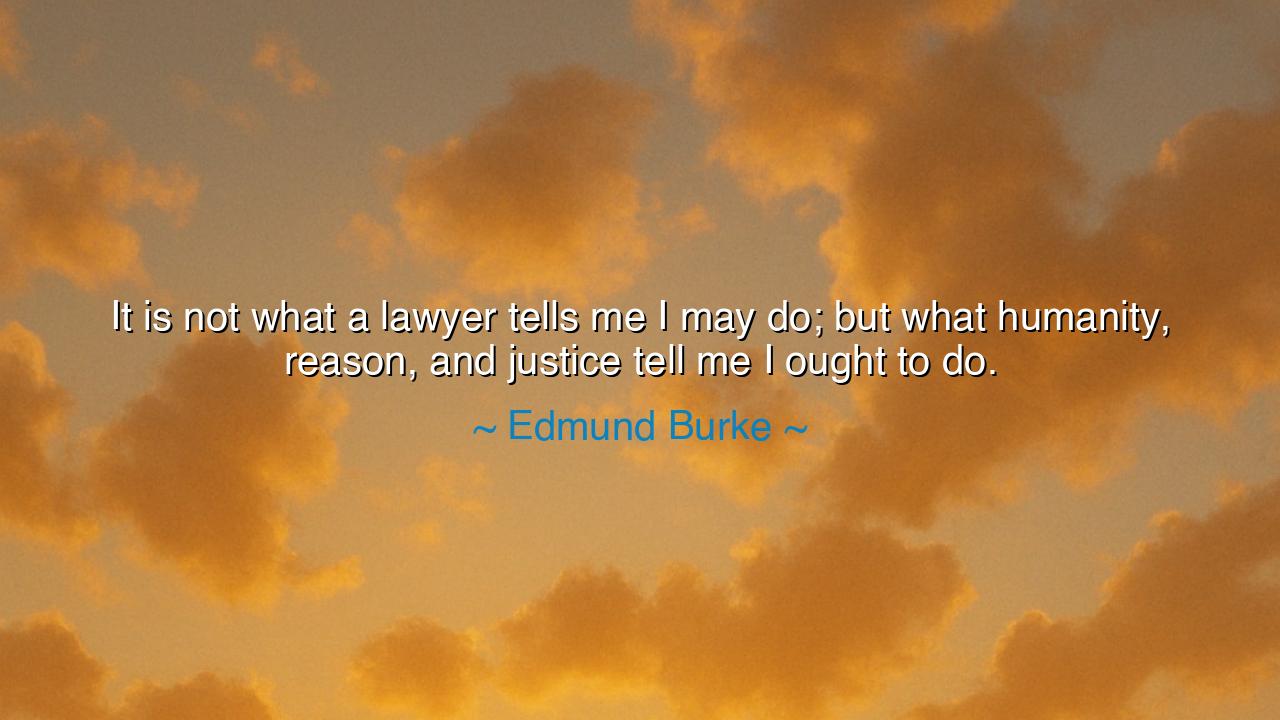
It is not what a lawyer tells me I may do; but what humanity
It is not what a lawyer tells me I may do; but what humanity, reason, and justice tell me I ought to do.






The words of Edmund Burke, “It is not what a lawyer tells me I may do; but what humanity, reason, and justice tell me I ought to do,” burn with the fire of eternal truth. They remind us that the boundaries of legality are not the same as the boundaries of morality. Law may give permission, but conscience demands higher obedience. Burke, the great orator and philosopher of the eighteenth century, spoke these words as both a rebuke and a call to action: that men and women must never hide behind the shield of legality when their hearts know what is right.
The origin of this saying comes from Burke’s lifelong struggle with questions of power, liberty, and morality. He lived in an age when empires expanded, laws were written to justify exploitation, and technical legality was often used to excuse oppression. Burke, with his unshakable belief in moral order, declared that humanity, reason, and justice stand above the letter of the law. For laws may be twisted by the mighty, but truth belongs to all. His words were a sword against hypocrisy, a reminder that what one can do is not always what one should do.
History gives us a luminous example in the life of Abraham Lincoln. Before becoming president, Lincoln was a lawyer. Yet he often warned his fellow practitioners that winning a case by clever argument was not always the same as serving justice. As president, when confronted with the monstrous evil of slavery, he could not rest on what the Constitution at that time permitted. Instead, he turned to what humanity, reason, and justice declared: that no man ought to be enslaved. His Emancipation Proclamation was not merely legal strategy; it was moral necessity. In this, Lincoln walked the very path Burke described.
The deeper meaning of Burke’s words is that the law is a tool, but not the master of the human spirit. Laws can be unjust, for they are written by flawed men. They can be manipulated, for they are enforced by those with power. But within every human heart burns the light of conscience, the whisper of reason, the demand of justice. To live only by the law is to live as a servant of circumstance. To live by humanity and justice is to live as a free soul, guided by truth.
Yet this truth is not easy. It demands courage. For to follow humanity over legality often means standing against the crowd, resisting the powerful, enduring ridicule or punishment. Those who hid Jews during the Holocaust did not act because the law permitted them—it forbade them. They acted because justice demanded it. Burke’s words call us to this same bravery: to choose what is right, even when it is dangerous, even when it is costly.
The lesson for us is plain. When confronted with choices in our own lives—whether in business, politics, family, or community—we must ask not only, “What is legal?” but, “What is right?” Do not excuse cruelty, dishonesty, or selfishness because they are permitted. Instead, ask what justice requires, what reason affirms, and what humanity whispers in your heart. For the measure of a life is not how well one obeyed the law, but how faithfully one upheld truth.
Therefore, let us walk as Burke counseled: not as slaves of permission, but as guardians of duty. Let us use law as a guide, but let justice be our compass. Let us remember that legality without morality is emptiness, but morality without courage is silence. The world does not need more cleverness in bending the law; it needs more steadfast souls who rise above it to defend what is eternal.
So let Burke’s words endure across the ages: “Not what a lawyer tells me I may do; but what humanity, reason, and justice tell me I ought to do.” May they be a light to all who are tempted by convenience, a shield to all who are pressured by power, and a summons to all who would live with honor. For in the end, the true law is not written in books, but in the conscience of the human soul.






AAdministratorAdministrator
Welcome, honored guests. Please leave a comment, we will respond soon